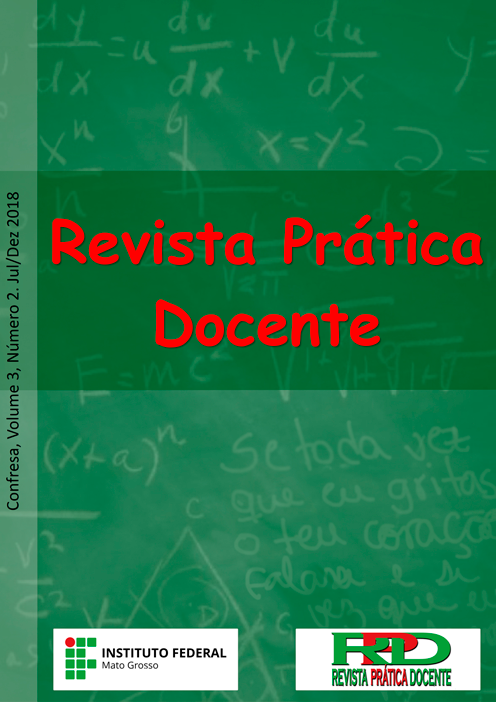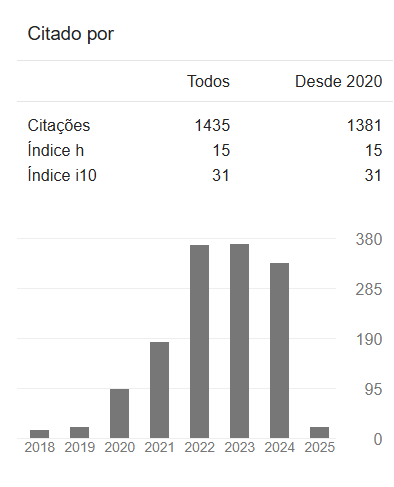ENVIRONMENTAL EDUCATION AND SCIENCE TEACHING: CONTRIBUTIONS FROM A FIELD CLASS
DOI:
10.23926/RPD.2526-2149.2018.v3.n2.p539-556.id235Keywords:
Environmental Education, Science Teaching, Field ClassroomAbstract
The National Environmental Education Policy regulates the need to contemplate Environmental Education at all levels and modalities of teaching, without delimiting it as a specific discipline of the curriculum. The present research had as objective to identify the conceptions of environment developed in a field class with high school students of a State School in Integral Time in the municipality of Rondonópolis, MT. The methodological course was based on a previous visit to the study site, the application of the pre-camp questionnaire, the script for the discussion wheel, the experience in the field and the application of the post-field questionnaire. The results of the initial questionnaire and the discussion wheel show that students are not clear about what they mean by Environmental Education, and the Nature and Place Concepts are the most frequent ones. Through the reports during the field class and the questionnaire it was possible to perceive more comprehensive conceptions about the environment compared to the results obtained initially. It can be concluded that during the field lesson, feelings of well-being, friendship, solidarity, sharing and respect flowed that triggered in meaningful learning of scientific concepts through living in a natural environment.
Downloads
Metrics
References
ANASTASIOU, L. G. C.; ALVES, L. P. (Orgs.). Processos de Ensinagem na Universidade. Pressupostos para as estratégias de trabalho em aula. 3.ed. Joinville: Editora Univalle, 2004. 145p.
ANASTASIOU, L. G. C. Ensinar, Aprender, Apreender e Processos de Ensinagem. In: ANASTASIOU, L. G. C.; ALVES, L. P. (Orgs.). Processos de Ensinagem na Universidade. Pressupostos para as estratégias de trabalho em aula. 3.ed. Joinville: Editora Univalle, 2004. 145p.
BARROS, M.P.; MUSIS, C.R.; HORNICK, C. Parque da Cidade Mãe Bonifácia, Cuiabá-MT: Topofilia e amenização climática em um fragmento de cerrado urbano. Revista da Sociedade Brasileira de Arborização Urbana, v.5, n.2, p.01-18, 2010. DOI: https://doi.org/10.5380/revsbau.v5i2.66264
BRASIL. Lei nº 9.795, de 27 de abril de 1999. Institui a Política Nacional de Educação Ambiental e dá outras providências. Diário Oficial da União, Brasília, 1999.
BRASIL. Lei nº 13.005, de 25 junho de 2014. Aprova o Plano Nacional de Educação – PNE 2014 - 2024 e dá outras providências. Diário Oficial da União, Brasília, 2014.
BRASIL. Portaria Nº - 1.145, de 10 de Outubro de 2016. Institui o Programa de Fomento à Implementação de Escolas em Tempo Integral. Diário Oficial da União, Brasília, 2016. http://portal.mec.gov.br/docman/outubro-2016-pdf/49121-port-1145-11out-pdf/file acessado em 20/08/2018.
BRASIL. Medida Provisória no 746, de 22 de setembro de 2016. Diário Oficial da União, Edição Extra. Brasília, 2016. Disponível em http://portal.mec.gov.br/index.php?option=com_docman&view=download&alias=48601-mp-746-ensino-medio-link-pdf&category_slug=setembro-2016-pdf&Itemid=30192 acessado em 20/08/2018.
CÉSAR, D. M.; CAMPOS, C. R. P. Percepções ambientais em uma aula de campo no Ensino de Ciências: o que dizem os estudantes. In: XI Encontro Nacional de Pesquisa em Educação em Ciências, 2017. Anais. Florianópolis: Universidade Federal de Santa Catarina. n.p.2017.
COSTA, R.G.S.; COLESANTI, M.M.A Contribuição da Percepção Ambiental nos Estudos das Áreas Verdes. RAEGA v. 22, p. 238-251, 2011. DOI: https://doi.org/10.5380/raega.v22i0.21774
JUNQUEIRA, M.E.R.; OLIVEIRA, S.S. de. Aulas de Campo e Educação Ambiental: Potencialidades Formativas e Contribuições para o Desenvolvimento Local Sustentável. Revista brasileira de Educação Ambiental. v.10, n 3, p.111-123, 2015. DOI: https://doi.org/10.34024/revbea.2015.v10.1910
MATO GROSSO. Lei Complementar Nº 043, de 28 de Dezembro de 2006. Plano Diretor Participativo de Desenvolvimento Urbano e Ambiental do Município de Rondonópolis, e dá outras providências. Disponível em http://www.rondonopolis.mt.gov.br/docs/Lei_Complementar_043-28-12-2006-PLANO_DIRETOR.pdf acessado em 20/11/2017.
MATO GROSSO. Lei Nº 10.111, de 06 de Junho de 2014. Dispõe sobre a revisão e alteração do Plano Estadual de Educação, instituído pela Lei nº 8.806, de 10 de janeiro de 2008. Disponível em http://fne.mec.gov.br/images/PEE/MTPEE.pdf acessado em: 20/11/2017
MATO GROSSO. PEE – Plano Estadual de Educação. Secretaria de Estado de Educação. Cuiabá: 2006.
ORÓ, I. Conhecimento do Meio Natural. In: ZABALA, A. Como trabalhar os conteúdos procedimentais em aula. 2ª ed. Porto Alegre: Editora Artmed, 1999. 194p. cap.1 p. 21-32.
SAUVÉ, L. Educação Ambiental: limites e possibilidades. Educação e Pesquisa. v.31 n.2, p.317-332. 2005. DOI: https://doi.org/10.1590/S1517-97022005000200012
SENICIATO, T.; CAVASSAN. O. Afetividade, motivação e construção de conhecimento científico nas aulas desenvolvidas em ambientes naturais. Ciências e Cognição, v.13, n.3, p.120-136. 2008.
Downloads
Published
How to Cite
Issue
Section
License
Copyright (c) 2023 A Revista Prática Docente tem o direito de primeira publicação

This work is licensed under a Creative Commons Attribution-NonCommercial 4.0 International License.
Authors who publish in this journal agree to the following terms:
- Authors retain the copyright and grant the journal the right of first publication, with the paper simultaneously licensed under the Licença Creative Commons Attribution allows the sharing of the work with acknowledgment of authorship and initial publication in this journal.
- Authors are authorized to take additional contracts separately, for non-exclusive distribution of the version of the work published in this journal (e.g. publish in institutional repository or as a book chapter), with acknowledgment of authorship and initial publication in this journal.











